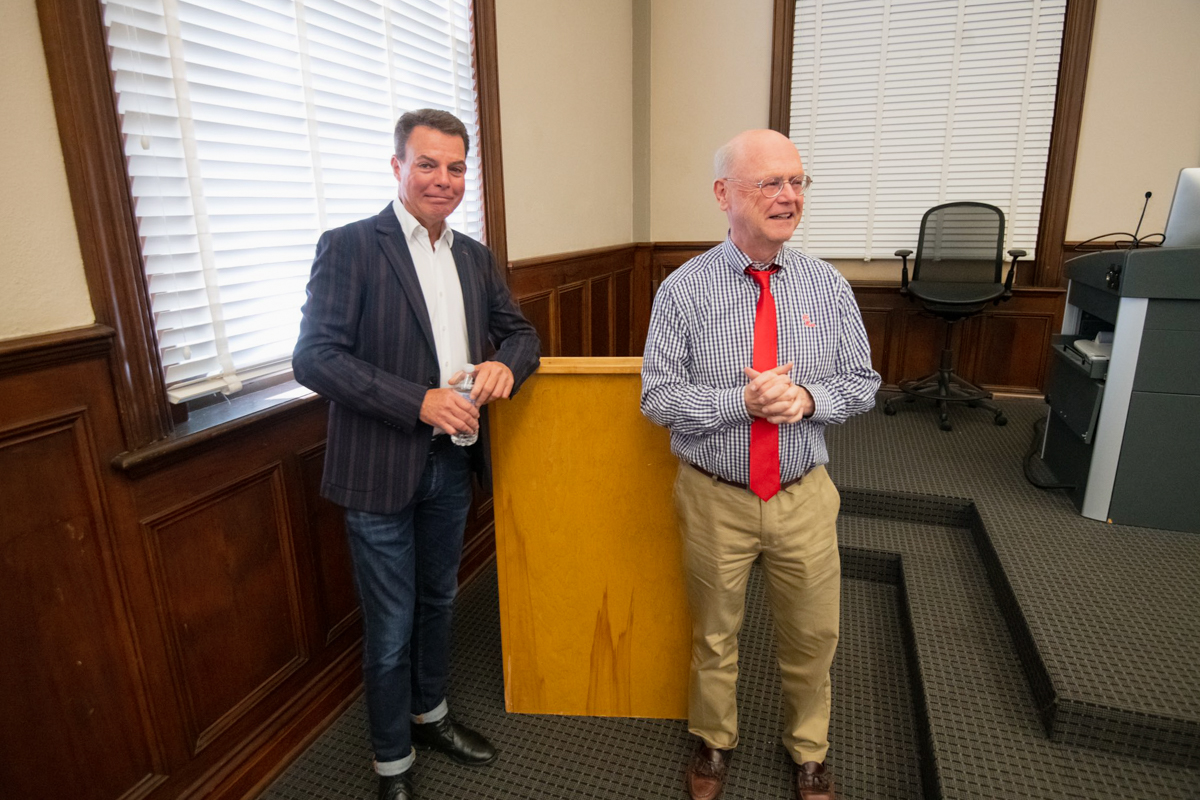The UM Emails
Part I • Part II • Part III
This is Part III of a three-part investigative package.
In mid-March 2020, as the novel coronavirus began spreading through Mississippi and forcing schools, colleges, and universities to consider extending spring break or shutting down altogether, then-University of Mississippi School of Journalism and New Media Dean Will Norton received a surprise email: a public-records request from a group called “Transparent Ole Miss.”
The clandestine organization was seeking copies of his university work-related emails that included keywords and phrases like, “Klan Hood,” “Adam Ganucheau,” “media policy” and “Shep Smith.” The requester also sought copies of email correspondences Norton had shared with wealthy alums Blake Tartt and Ed Meek.
Norton forwarded the request to UM counsel Erica McKinley.
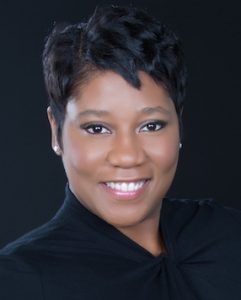
“Erica, would it do any good if I just resigned as dean? Would the person then relent? We have so much we are trying to do right now,” Norton wrote. “(Network Manager) Jack Lawton told me yesterday that he just cannot get the information for all those categories given what we are having to do right now to prepare for this emergency. … It obviously is someone who knows the operation of our school.”
McKinley said she would handle the request, and Norton thanked her, saying that it was “a difficult time for getting such a request.”
While officials worked to fulfill the initial public-records request, one of its subjects, Tartt, responded to a UM fundraising email, perhaps shattering any illusions that he planned on giving another dime to the university any time soon.
“Are you crazy? Ole Miss no longer hold (sic) the values that made it so mighty and great!” the 1984 alumnus wrote on March 28, 2020. “Hopefully you are able to get the faculty, socialist (sic) and folks fighting Christianity to give to your campaign. Until we see real change back to core Ole Miss values, no money from this alumnus. Will urge ALL alumni to give nothing. Ole Miss has been destroyed.”
UM faculty in the development and athletics departments emailed back and forth about Tartt’s reply, trying to work out whether the businessman’s email meant school officials should stop reaching out to him in pursuit of donations. Matt Mossberg, the associate athletics director and chief development officer, offered his assessment.
“I have spent a lot of time with Blake and I’m not surprised at his response. … Unfortunately, there doesn’t seem to (be) an end in sight based on the things he wants ‘changed,’” Mossberg wrote to his colleagues. “We will continue to interface with him the best we can.”
By the next day, though, UM faculty members and officials began receiving copies of emails that the UM Office of General Counsel had uncovered while processing Transparent Ole Miss’s initial public-records request—including the September 2018 correspondences in which Tartt self-identified as the source of the photos in Ed Meek’s Facebook post.
Neither Norton nor Tartt have responded to multiple requests for comment for this story.
Norton Called Gay Alum Shepard Smith ‘Very Troubled’
They also received copies of emails in which Norton discussed the sexuality of one of the school’s most famous alums, former Fox News host Shepard Smith.
In October 2019, Smith resigned from Fox News. Days later, one of Norton’s acquaintances emailed the journalism dean about the surprising news, saying that he was “surprised to learn that he is gay.”
Norton, who had been in contact with Smith at the time to arrange a visit to the journalism school, told the acquaintance he was concerned for his former student.
“I taught Shep Smith when he was married to a fine young woman,” Norton wrote back on Oct. 16, 2019. “He has major challenges. I hope to get to know him better in coming months. I think he is very troubled.”
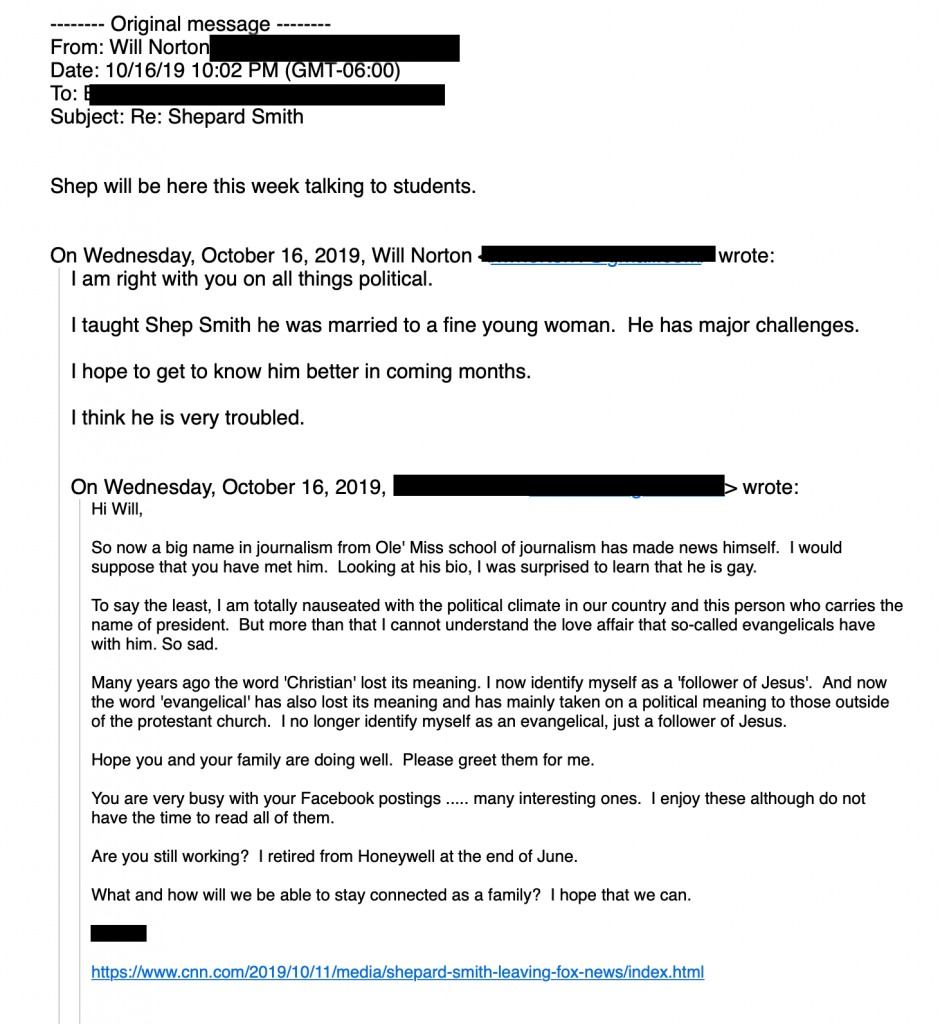
Two days after that email, the journalism dean welcomed Smith to the school, where Smith sat and talked with students about his memories of UM and about what it takes to be a good journalist. Smith, who has since taken a job at CNBC, showed no indications that he was “troubled.”
Other emails in the trove of documents show that, over the next few weeks, Norton and other school officials continued working to bring Smith back to the school in the spring 2020 for the Silver Em awards ceremony (which has overwhelmingly honored white men over the years). The school announced in late January 2020 that Smith would travel to Oxford on April 1 to receive the school’s “prestigious Silver Em award.”
“When Shep was in school, he was always in a hurry, carrying a big camera with lots of equipment trying to get to his next appointment,” Norton said fondly in the January statement, praising the former anchor as “someone devoted to the facts.”
The school postponed the awards ceremony, though, as the novel coronavirus swept the nation in the weeks after the announcement.
Norton Said Tartt Offered to Help Him Resign
On March 30, 2020, Paul Caffera, the ombudsman, wrote to Provost Noel Wilkin, saying he had received a trove of correspondences between Norton and Blake Tartt that happened “in August of 2018—about three months after Dean Norton’s ‘Klan hood’ comments.”
In the email to Wilkin, Caffera said the trove included emails “that (a) faculty member found disparaging to homosexuals in general, and to UM alumnus Shepard Smith in particular,” Caffera wrote.
“Reportedly, there are dozens of other emails related to Dean Norton and other sensitive/incendiary matters,” Caffera wrote, adding that the emails had “made their unsolicited way to (a) faculty member” who “has felt intimidated by Dean Norton in the past.”
The faculty member, Caffera continued without identifying the person by name, was “concerned that the emails may find their way to the press.”
But Wilkin had already received the emails a day before, on March 29. A subsequent set of emails from an additional public-records request shows that the provost forwarded them to Norton, saying he had received them from Katrina Caldwell, the UM vice chancellor for diversity and community engagement who has since left the university for a job at Johns Hopkins University in Baltimore.
Norton wrote back on April 1, saying he had “sent a message to Shep.” He also said that Tartt had already contacted him sometime earlier saying that a “group … had his emails.”
But that was before Transparent Ole Miss made its public-records request—and the group Tartt was referring to was a conservative group, Norton wrote.
“He had told me several months ago that there was going to be a campaign against me and that I should talk to the chancellor about when I was to resign,” Norton wrote. “He said he would set up the meeting for me. He checked with whatever sources that there were who were going to run a campaign against me, and he said they knew nothing about this. So I assume it is not a right-wing group, but a group with some to her persuasion.”
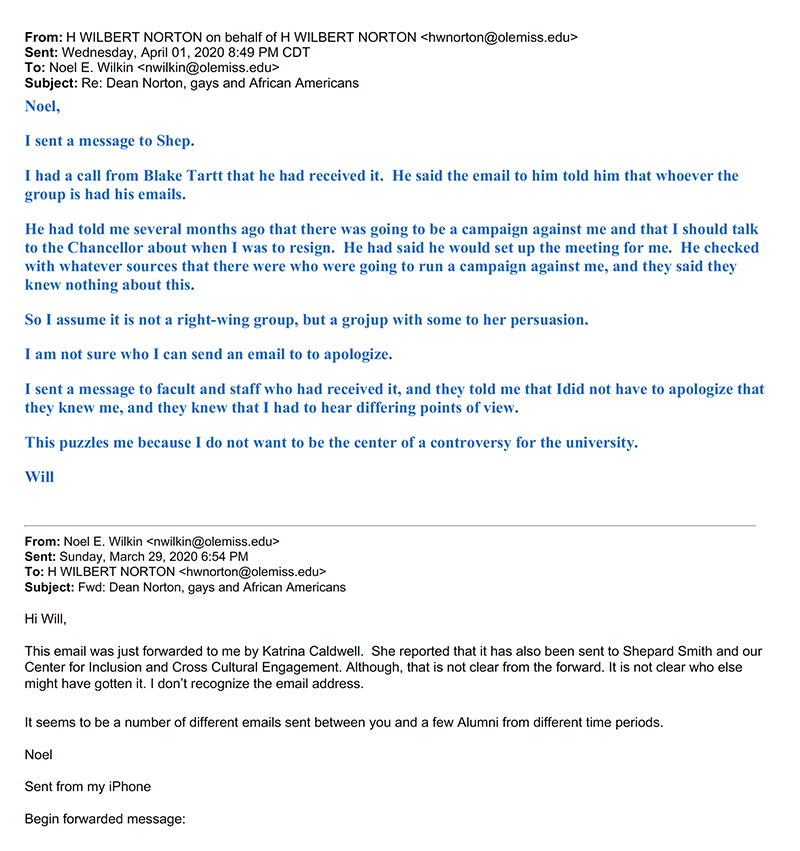
The email does not make it clear what Norton means by “some to her persuasion.”
“I am not sure who I can send an email to to apologize,” Norton wrote. “I sent a message to faculty and staff who had received it, and they told me I did not have to apologize that they knew me, and they knew that I had to hear differing points of view. This puzzles me because I do not want to be the center of a controversy for the university.”
‘I Haven’t Been a Dean for Four Years’
The next day, on April 2, Leslie Westbrook, an adjunct integrated marketing communications professor with expertise in crisis management, emailed Norton, saying she had also received the emails from an anonymous source who identified himself as Winston Smith. The sender asked her if she was aware of Norton’s involvement with “the person who pressured Ed Meek to publish those photos on Facebook,” noting that it “sure seems like Norton shares Blake Tartt’s racial views and was happy to throw Ed Meek under the bus.”
“Someone is sending this info/these emails to me. Not sure why. FYI. Do you have a clue?” Westbrook wrote.
The dean responded the same day.
“Leslie, I feel I have been straight with each person,” Norton wrote. “I will gladly resign if folk want me to do so. I am very upset with the way I am getting portrayed after being portrayed all these years as a radical. I have been supportive of Shep throughout his career and all the students I have known. I do not know why someone would be doing this so publicly instead of coming to me and asking me to resign.”
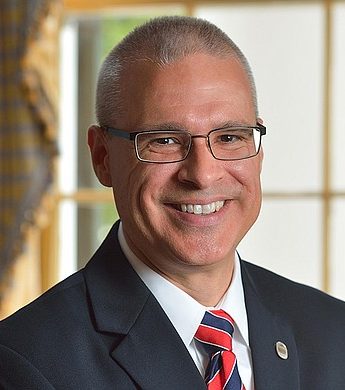
Sources familiar with the events told the Mississippi Free Press that three weeks later, on April 23, Norton told the journalism faculty during an 11 a.m. Zoom meeting that he was supposed to meet with the provost later that afternoon. Several hours later, at 4:51 p.m., Provost Noel Wilkin sent an email to the school announcing that Norton had “decide(d) to return to the faculty.”
Hours later, at 7:58 p.m., Debora Wenger, a journalism professor and then the assistant dean for innovation and external partnerships, emailed faculty members a note from Norton in which he cited his age and the novel coronavirus pandemic as motivating factors for his resignation.
“My strengths are in raising funds, recruiting, and finding support for projects in the school,” Norton wrote. “Unfortunately, this is not an environment in which these strengths are effective, and I believe new leadership will bring skills and energy needed to make and implement future decisions.”
HottyToddy.com, the outlet that the journalism school acquired from Ed Meek days before his controversial September 2018 Facebook post, ran a story about Norton’s resignation that day. Sources sent the Mississippi Free Press screenshots of comments that several users left on the story that included links to copies of some of Norton’s September 2018 emails with Tartt. Hotty Toddy removed those comments, the sources say. As of July 17, 2020, there were no comments on the story, and the emails remained unreported—until now.
Several days after the announcement, the journalism dean further discussed his resignation in a Zoom meeting with journalism-school faculty. The Mississippi Free Press obtained an eight-minute recording of the remote meeting. On the Zoom call, Norton said he “probably should have retired from being dean four years ago.” At 78 years old, he said, he is in the high-risk group during the COVID-19 pandemic.
“My strength is meeting people away from the university and making them friends for us and getting money, and I can’t travel now. I will be very concerned about being in a classroom,” the dean told the faculty. “I’m not sure that there will be much more than shelter-in-place for me the rest of my life. So I think this is really important if I want to live a longer life, and I hope you understand.”
Norton repeatedly downplayed his effectiveness in the role, saying he had been minimized to only doing “grunt work,” like letter writing.
“I think basically I haven’t been a dean for four years,” he said. “I’ve been handing out work for other people, and they know how to do the work much better than I do.”
But despite the fact that Norton had minutes earlier cited pandemic fears as one of the motivators behind his decision to step down, the outgoing dean said he planned to remain on as a faculty member and teach writing classes.
“It’s important for me to have some free time now, but it’s also important for me not to go totally to free time,” Norton said. “So that’s why I decided to teach, and I would like to see what students are truly like in the classroom now compared to when I was teaching full time.”
But he had a request for his colleagues: He wanted to stay out of any future drama.
“The only thing I ask is that people not talk to me about the school. I don’t want to be the source for any trouble for anybody who is the administrator after me,” Norton said. “So I will come and I will be at the office eight hours a day, and I will teach my classes, but I won’t do much socializing. I’m going to be an outlier, but I will do my duty as hard as I can. I will ask you all for help. But I don’t want to be part of the politics of the school.”
The resignation took effect on May 11, 2020. Norton had been the school’s dean since 2009.
The provost appointed Debora Wenger as the interim dean.
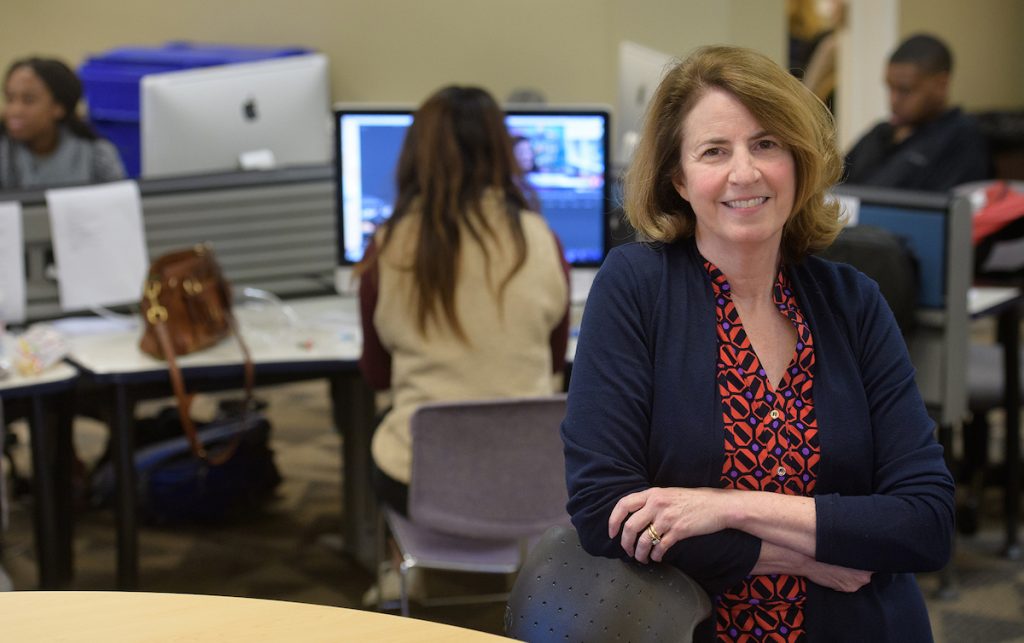
Two months later, Norton, who never responded to multiple requests for comment for this story, resigned from the board of Mississippi Today.
“Will Norton resigned from the Mississippi Today board of directors in mid-July,” editor-in-chief Adam Ganucheau confirmed in his Aug. 1 statement to the Mississippi Free Press. “I presume he had a good reason for doing so, but our mission and work continues regardless of who is on the board.”
‘A Sickness That Permeates Ole Miss’
In April, “Winston Smith,” one of the anonymous sources, submitted a letter to the editor to The Daily Mississippian, one of UM’s official publications, in which he invoked Norton’s emails and Tartt’s September 2018 video at The Square.
“Oh, that awful and offensive video narrated by one of the rich and powerful people who pull the strings at Ole Miss” and who “watches the Rebs play from high above the field in a luxury box (and) mercilessly mocks African American women,” Smith wrote. “The misogyny drips from his voice.”
At least when Meek made his offensive Facebook post, Smith continued, the university removed his name from the journalism school.
“What happened to the video narrating donor?” Smith wrote, referring to Tartt. “The IHL selected him to serve on the committee appointed to find a new chancellor. A school with the racial history of Ole Miss appointed the person who took these photos, shot this video and wrote these vile comments about African Americans to find a new chancellor.”
Smith shared an email with the Mississippi Free Press that he received from The Daily Mississippian’s editor-in-chief, Eliza Noe, telling him that the school paper could not publish his letter because “the DM does not publish letters using pen names, and letters may not have more than 300 words.”
Winston Smith’s letter also took aim at the university’s recent controversial media policy, which requires faculty to alert an administrator before speaking with members of the press.
“There is a sickness that permeates Ole Miss and it is enabled by a culture of secrecy,” Smith wrote. “Recent efforts to silence faculty through an oppressive media relations policy are but a symptom of this disease brought upon Ole Miss by the neo-Confederates and racists who pull the strings in Mississippi and at Ole Miss and do not want a campus for ALL Mississippians. We all know about the hidden institutional racism at Ole Miss.”
Emails from late 2018 show University Ombudsman Paul J. Caffera initially ran into a wall of secrecy when he sought documents from the journalism school related to an August 2018 hiring search that a faculty member had anonymously raised concerns about.
Caffera wrote to Assistant Dean for Curriculum & Assessment and Associate Professor of Integrated Marketing Communications Scott Fiene on Dec. 12, 2018, saying he “would be grateful if you would send me a copy of the ads” for the positions. The emails do not make clear which “positions” Caffera was referencing. When he did not get a response by Dec. 14, the ombudsman wrote back again on Dec. 14, saying he would “make a public request for the materials” if necessary, but thought it “preferable to obtain the materials through an informal process.”
Fiene wrote back that day and copied his email to Journalism Dean Will Norton, Provost Noel Wilkin, and Associate Provost Donna Strum.
“Paul, I have been told to refer you to HR on this,” Fiene wrote.
Caffera wrote back on Dec. 17, saying “the ads we discussed have not yet arrived” and offering to “swing by in a little while and pick them up.”
Fiene replied, saying he “did not send the info.”
“Since our earlier convo I have been advised that if a faculty member has a concern about a search, they are to be referred to the appropriate area (HR, EORC, Search Chair, etc.) for information,” Fiene wrote. “I hope you will convey that to the faculty person or persons who has complained.”
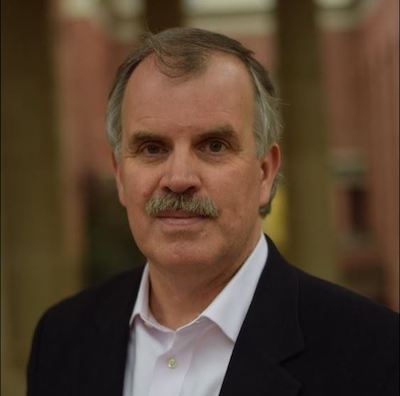
Caffera replied that evening, in an email he copied to Norton, Wilkin, Strum, and Equal Opportunity and Regulatory Compliance Interim Director Gene W. Rowzee.
“Scott, the University of Mississippi created the Office of the Ombuds in order to provide employees with a confidential avenue to address issues affecting their work life, especially when they have fear of raising issues, concerns, or complaints in their own name either through or outside of their chain of command,” the ombudsman wrote.
“With all due respect to you and other administrators in JNM (the School of Journalism and New Media), no administrator on this campus may require an employee to forego using the services of the Office of the Ombuds in order to address concerns they may have with their workplace, regardless of whether those concerns are founded or unfounded.”
Only employees could ascertain whether they “have a reason to be fearful of raising a concern,” Caffera wrote—”not that employee’s leadership or anyone else on campus.”
The ombudsman then cited the furor that erupted in the journalism department after Mississippi Today’s Adam Ganucheau reported on a leaked recording of the journalism faculty member that took place the day after Ed Meek’s infamous Facebook post.
The Mississippi Free Press reported in Part II of this series that Ganucheau’s 2018 story did not reveal that faculty members had named Tartt as the probable source of Meek’s photos, which the recording shows. Ganucheau said in a statement that he tried to verify Tartt’s involvement, but could not prove it at the time. Nearly two years after the journalism faculty meeting, no other media outlet or journalist had investigated and reported on Tartt’s role in the Ed Meek incident before this series. Transparent Ole Miss started sharing emails discovered in the public-records request with faculty members months before this series published.
In late 2018, though, some in the department may have tried to uncover the identity of the whistleblower who recorded the meeting where two members implicated Tartt as the photographer, Ombudsman Caffera’s Dec. 17 email suggests.
“The alleged recent efforts of JNM Leadership to persuade a reporter to reveal the name/names of the sources/sources who provided the news outlet Mississippi Today (on whose Board of Directors Dean Norton sits) with a recording (or recordings) of a September 20 meeting at Farley Hall … might reasonably persuade an employee of JNM that JNM Leadership could be inclined toward vindictiveness,” Caffera wrote. “Allegedly, during a Nov. 30, 2018 JNM School meeting, Dean Norton informed the JNM faculty of the School’s attempts to uncover the identity/identities of Ganucheau’s source/sources,” Caffera wrote.
In his Aug. 1, 2020 statement to the Mississippi Free Press, Ganucheau had only praise for Norton.
“Even through my years of reporting that caused him and the school he led—my alma mater—much turmoil, he never overstepped. He always acted toward me with complete journalistic and professional integrity,” Ganucheau said.
Emails predating these show that while some journalism faculty expressed anger that the Sept. 20 meeting had been secretly recorded, others felt the meetings should be on the record under Mississippi’s public-meetings laws.
In Caffera’s Dec. 17, 2018, email, the ombudsman said that he had “always enjoyed (his) conversations” with the journalism dean.
“That said, given the circumstances noted above, it does not appear unreasonable for some employees of JNM to have concerns about coming forward without the cloak of anonymity that the Ombuds Office is able to provide,” he wrote. “When I first made my request for the documents related to ad postings, I did so under the assumption that JNM had acted appropriately; I had fully expected to be able to allay the faculty members’ concerns promptly.
“The school’s steadfast resistance to providing the Ombuds Office with the materials I requested,” Caffera continued, “might reasonably raise questions about whether JNM followed” proper recruitment protocols.
In an email to Fiene, Wilkin, Norton, Strum and Rowzee later that night, though, UM General Counsel Erica McKinley directed the administrators not to turn any information over to Caffera.
“Please know that the General Counsel’s office will respond and manage any further information from Paul on the matters discussed below,” McKinley wrote. “Please do not provide Paul any requested material, whether email, documents, or recordings. If Paul engages you again or if you receive any further requests from Paul, please direct him to the General Counsel’s office. In issuing this directive, I am not usurping or otherwise intruding upon the authority of the EORC or HR.”
Although McKinley marked her email “privileged and confidential” and as “attorney client communication,” it appeared in the trove of public-records the university turned over.
The UM communications department did not respond to a request for comment for this story.
‘The People With the Most Stories Probably Won’t Talk’
Brian Powers, the 2017 journalism school alumnus who attended UM for a year in the mid-1990s before returning to finish his degree in 2013, told the Mississippi Free Press that he thinks the “culture of secrecy” exists even outside the university’s walls and among many former students—including ones who disagree with their fellow alums’ calls for the campus to return to the rebel-flag-waving days of their youth.
“The current students aren’t like the loudest of the alumni,” Powers said. “I think it’s a small group of wealthy people who graduated in the 1980s who are still holding onto the past, but they’re a lot more vocal about it than alumni who just want the school to make money. I know enough alumni who are my age who don’t agree with what those alumni say. They still give money. I know alumni who talked to me about how they wanted the Confederate monument to come down, but they don’t want to say it because they’re afraid they’ll lose their business ties.”
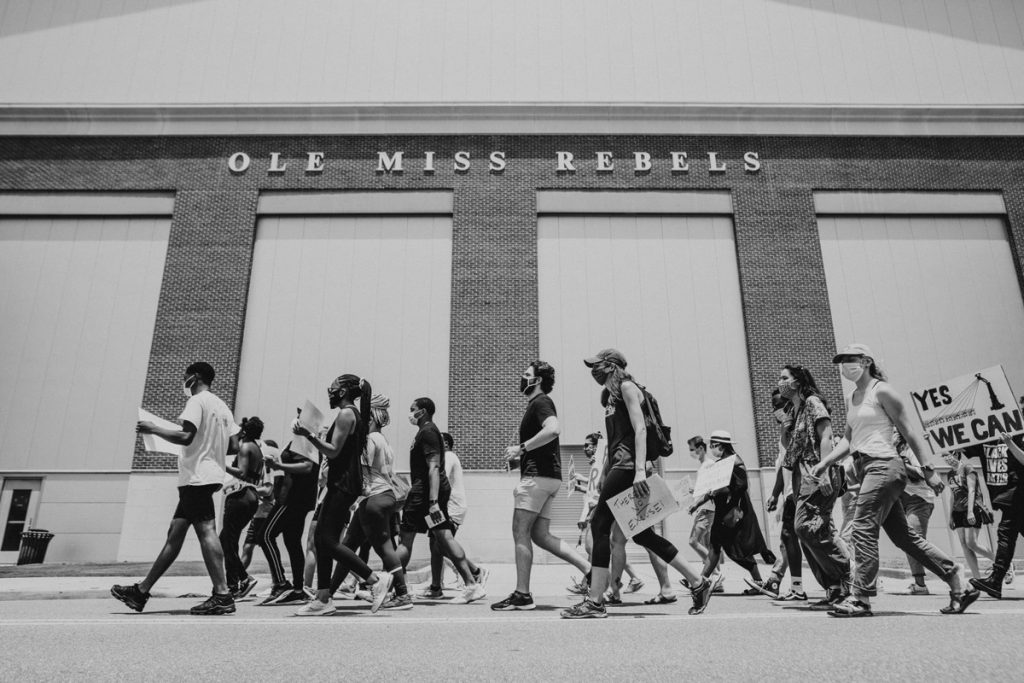
Jennifer Sadler, the African American former faculty member who shared the story of Norton’s May 2018 “klan hood” remark with the Mississippi Free Press, also described a university culture where people feel pressured to stay quiet.
“The people with the most stories probably won’t talk because they’re still employed there,” she said.
Though Sadler publicly called out instances of racism while she was an employee at the school, she added that fears of reprisal are not necessarily misplaced.
Asked if she preferred to remain anonymous like numerous other sources for this story, Sadler said no.
“I don’t give a damn about any of that. I don’t care about that. The whole culture of being silent is the reason they have as many problems as they do now,” she said.
“So you can say whatever I said, because it happened.”
Editor’s Note: In the reporting of the UM emails series and follow-up reports, the MFP did not confer with members of either of our boards or any donors associated with the University of Mississippi to avoid conflicts of interest.
Also see: From Racist Emails to ‘Witch Hunts’: A UM Emails Timeline
Watch: Reporter Ashton Pittman and Editor Donna Ladd discuss the series during the 2021 Ancil Payne Award for Ethics in Journalism ceremony (40:00) and read more about the award here.
Read the full UM Emails reporting series to date:
- ‘The Fabric Is Torn In Oxford’: UM Officials Decried Racism Publicly, Coddled It Privately
- ‘The Ole Miss We Know’: Wealthy Alums Fight To Keep UM’s Past Alive
- UM’s ‘Culture Of Secrecy’: Dean Quit As Emails Disparaging To Gay Alum, Black Students Emerged
- ‘Appalling’: UM Provost Decries ‘Hurtful’ Emails About Black Women, Gay Alum
- Ole Miss’ Coddle Culture: Ole Miss Will Stay ‘Ole Miss’ Without Radical Shift
- EDITOR’S NOTE: The Decisions, Process, Motives Behind Ashton Pittman’s Series On UM Emails
- Perpetuating Patterns: It’s Time To Build A Better University Of Mississippi
- After UM Emails, Dean Plans ‘Anti-Racist’ Training, Donor Changes to ‘Remake Our School’
- ‘Ole Miss’ Vs. ‘New Miss’: Black Students, Faculty On How To Reject Racism, Step Forward Together
- UM Closely Guards Climate Survey Providing Window Into Social Issues, Sexual Violence
- UM Probes Whistleblowers Who Exposed Racist Emails As Ex-Dean Keeps $18,000 Monthly Salary
- ‘Our Last Refuge’: UM Faculty ‘Terrified’ As Officials Target Ombuds In Bid To Unmask Whistleblowers
- ‘Like He Was Disappeared’: UM Faculty Fear Retaliation After Ombudsman Put On Leave
- UM Appoints Acting Ombuds As Weary Faculty See Effort To ‘Stamp Out’ Anti-Racism Voices
- UM Retaliating Against Ombudsman for Protecting Visitors’ Privacy, Org Says
- UM Accuses Ombudsman of ‘Raising False Alarms’ Over Whistleblower Investigation
- A Matter Of Trust: UM Controversy Shows How Ombuds Programs Should, Shouldn’t Function, Expert Argues
- UM Pursuing ‘Criminal Investigation’ Into Whistleblowers Who Exposed Racist Emails
- Ombuds ‘Exonerated’ As UM Emails Whistleblower Hunt Fails to Identify Sources
- Will Norton, Ex-Dean in ‘UM Emails’ Race Saga, Quietly Departs University

